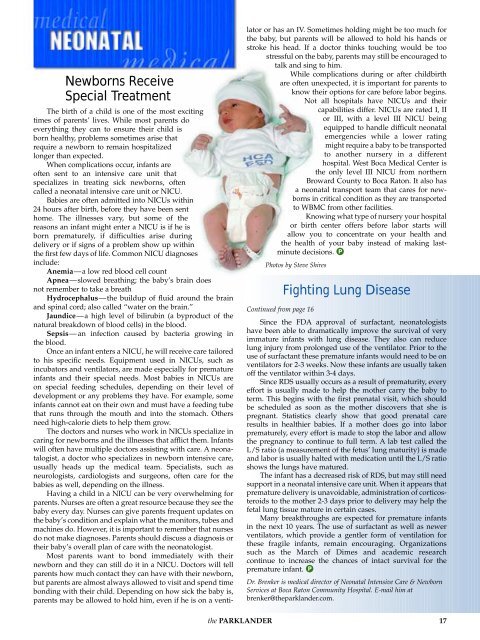Cover_Jan 05 (Page 2) - The Parklander Magazine
Cover_Jan 05 (Page 2) - The Parklander Magazine
Cover_Jan 05 (Page 2) - The Parklander Magazine
- No tags were found...
You also want an ePaper? Increase the reach of your titles
YUMPU automatically turns print PDFs into web optimized ePapers that Google loves.
Newborns Receive<br />
Special Treatment<br />
<strong>The</strong> birth of a child is one of the most exciting<br />
times of parents’ lives. While most parents do<br />
everything they can to ensure their child is<br />
born healthy, problems sometimes arise that<br />
require a newborn to remain hospitalized<br />
longer than expected.<br />
When complications occur, infants are<br />
often sent to an intensive care unit that<br />
specializes in treating sick newborns, often<br />
called a neonatal intensive care unit or NICU.<br />
Babies are often admitted into NICUs within<br />
24 hours after birth, before they have been sent<br />
home. <strong>The</strong> illnesses vary, but some of the<br />
reasons an infant might enter a NICU is if he is<br />
born prematurely, if difficulties arise during<br />
delivery or if signs of a problem show up within<br />
the first few days of life. Common NICU diagnoses<br />
include:<br />
Anemia—a low red blood cell count<br />
Apnea—slowed breathing; the baby’s brain does<br />
not remember to take a breath<br />
Hydrocephalus—the buildup of fluid around the brain<br />
and spinal cord; also called “water on the brain.”<br />
Jaundice—a high level of bilirubin (a byproduct of the<br />
natural breakdown of blood cells) in the blood.<br />
Sepsis— an infection caused by bacteria growing in<br />
the blood.<br />
Once an infant enters a NICU, he will receive care tailored<br />
to his specific needs. Equipment used in NICUs, such as<br />
incubators and ventilators, are made especially for premature<br />
infants and their special needs. Most babies in NICUs are<br />
on special feeding schedules, depending on their level of<br />
development or any problems they have. For example, some<br />
infants cannot eat on their own and must have a feeding tube<br />
that runs through the mouth and into the stomach. Others<br />
need high-calorie diets to help them grow.<br />
<strong>The</strong> doctors and nurses who work in NICUs specialize in<br />
caring for newborns and the illnesses that afflict them. Infants<br />
will often have multiple doctors assisting with care. A neonatalogist,<br />
a doctor who specializes in newborn intensive care,<br />
usually heads up the medical team. Specialists, such as<br />
neurologists, cardiologists and surgeons, often care for the<br />
babies as well, depending on the illness.<br />
Having a child in a NICU can be very overwhelming for<br />
parents. Nurses are often a great resource because they see the<br />
baby every day. Nurses can give parents frequent updates on<br />
the baby’s condition and explain what the monitors, tubes and<br />
machines do. However, it is important to remember that nurses<br />
do not make diagnoses. Parents should discuss a diagnosis or<br />
their baby’s overall plan of care with the neonatologist.<br />
Most parents want to bond immediately with their<br />
newborn and they can still do it in a NICU. Doctors will tell<br />
parents how much contact they can have with their newborn,<br />
but parents are almost always allowed to visit and spend time<br />
bonding with their child. Depending on how sick the baby is,<br />
parents may be allowed to hold him, even if he is on a ventilator<br />
or has an IV. Sometimes holding might be too much for<br />
the baby, but parents will be allowed to hold his hands or<br />
stroke his head. If a doctor thinks touching would be too<br />
stressful on the baby, parents may still be encouraged to<br />
talk and sing to him.<br />
While complications during or after childbirth<br />
are often unexpected, it is important for parents to<br />
know their options for care before labor begins.<br />
Not all hospitals have NICUs and their<br />
capabilities differ. NICUs are rated I, II<br />
or III, with a level III NICU being<br />
equipped to handle difficult neonatal<br />
emergencies while a lower rating<br />
might require a baby to be transported<br />
to another nursery in a different<br />
hospital. West Boca Medical Center is<br />
the only level III NICU from northern<br />
Broward County to Boca Raton. It also has<br />
a neonatal transport team that cares for newborns<br />
in critical condition as they are transported<br />
to WBMC from other facilities.<br />
Knowing what type of nursery your hospital<br />
or birth center offers before labor starts will<br />
allow you to concentrate on your health and<br />
the health of your baby instead of making lastminute<br />
decisions. ● P<br />
Photos by Steve Shires<br />
Continued from page 16<br />
Fighting Lung Disease<br />
Since the FDA approval of surfactant, neonatologists<br />
have been able to dramatically improve the survival of very<br />
immature infants with lung disease. <strong>The</strong>y also can reduce<br />
lung injury from prolonged use of the ventilator. Prior to the<br />
use of surfactant these premature infants would need to be on<br />
ventilators for 2-3 weeks. Now these infants are usually taken<br />
off the ventilator within 3-4 days.<br />
Since RDS usually occurs as a result of prematurity, every<br />
effort is usually made to help the mother carry the baby to<br />
term. This begins with the first prenatal visit, which should<br />
be scheduled as soon as the mother discovers that she is<br />
pregnant. Statistics clearly show that good prenatal care<br />
results in healthier babies. If a mother does go into labor<br />
prematurely, every effort is made to stop the labor and allow<br />
the pregnancy to continue to full term. A lab test called the<br />
L/S ratio (a measurement of the fetus’ lung maturity) is made<br />
and labor is usually halted with medication until the L/S ratio<br />
shows the lungs have matured.<br />
<strong>The</strong> infant has a decreased risk of RDS, but may still need<br />
support in a neonatal intensive care unit. When it appears that<br />
premature delivery is unavoidable, administration of corticosteroids<br />
to the mother 2-3 days prior to delivery may help the<br />
fetal lung tissue mature in certain cases.<br />
Many breakthroughs are expected for premature infants<br />
in the next 10 years. <strong>The</strong> use of surfactant as well as newer<br />
ventilators, which provide a gentler form of ventilation for<br />
these fragile infants, remain encouraging. Organizations<br />
such as the March of Dimes and academic research<br />
continue to increase the chances of intact survival for the<br />
premature infant. ● P<br />
Dr. Brenker is medical director of Neonatal Intensive Care & Newborn<br />
Services at Boca Raton Community Hospital. E-mail him at<br />
brenker@theparklander.com.<br />
the PARKLANDER 17
















